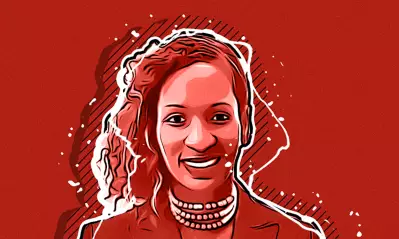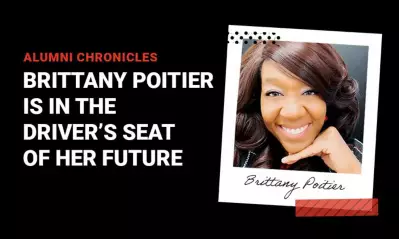Learning to fly: Millicent Rone is helping shape workplace culture at American Airlines

Written by Michael Feder

Plenty of times in her life, Millicent Rone (BSB/M and MBA) has been underestimated.
“I wasn’t supposed to be standing here in front of you being the influencer of today’s conversation,” Rone says, looking back on the events that brought her to the offices of American Airlines, where she now works as a senior specialist in the office of diversity, equity and inclusion.
Hers is a story full of doubters — people who looked at a teen mom from DeSoto, Texas, and didn’t see a future pageant winner, breadwinner, college graduate, IT specialist and diversity leader at one of the largest airlines in the world.
“People had written me off,” she says. Now she sits in a senior role, changing the internal culture of a major company to effect positive change in the world outside of it.
A multicultural upbringing
Many of the seeds for Rone’s future work in diversity and equity were sown in her upbringing. Though born in Corpus Christi, Rone moved to Colorado when she was 5 years old. Her parents were divorced, and her mother was her primary caregiver as well as her inspiration for both strength and personal confidence as she grew up.
“For me, all I saw was a hardworking mother,” Rone says. “All I saw was a mother laying before me a good work ethic.”
In Colorado, Rone experienced “diversity at its best.” Her best friend was white, another friend was from Holland, another was the child of a celebrity and another had an upbringing that modeled Rone’s: a Black girl raised by her mother and grandmother.
“I had all this in front of me,” Rone recalls, “and I had no idea what each of these experiences and relationships would do as part of cultivating who I would become. Each and every one laid an impression, from the foods I would eat to the languages I would be around, to the experiences I would encounter.”
Rone‚Äôs experiences in Colorado created a set of expectations about what she wanted out of life. The cultural diversity surrounding her exposed her to the wealth of possibilities that were out there.¬Ý
Back to Texas
It wasn’t until she moved back to Texas in seventh grade that she truly experienced racism for the first time, she says. She went to school in a predominantly white neighborhood with predominantly white students. She didn’t fit in culturally with them. On the other hand, light skin and a Colorado accent left her feeling alienated from her Black peers.
It took some time to adjust, but by the time she reached high school, Rone had found her place on the track team. Her mother, while supportive, felt that Rone should be more well rounded in her pursuits.
“My mother was like, ‘You’re a tomboy!’” Rone says, laughing. At her mother’s behest, she enrolled in a John Robert Powers Modeling School. This experience helped Rone develop confidence socially. It taught her about authenticity, or in her words, “How do you show up with who you are at your best?”
During this time, she developed important skills that would help her advocate for herself and influence others, skills she uses every day in her current role. Her freshman year, she entered the Miss Flame Pageant, a Texas-based youth beauty pageant. She became the first Black person to place in the top four finalists of that pageant.
Pivot point
Soon after that, things took a detour for Rone. During her sophomore year of high school, she fell in love with the high school running back. Then she found out that she was pregnant.
“That. Was. My. Pivot. In. Life,” Rone says, underscoring the point. She grew up with a Christian background and felt a sense of “ridicule” from her family. The pressure may have been too much for someone else, but not for Rone. She took her pregnancy in stride, making it her mission to prove that “it did not matter how you start, but that it mattered how you finished.”
With a child on the way, there were plans and goals she needed to readdress[CH1]¬Ý. Rone started on an accelerated path toward graduation and worked hard to achieve a high level of academic recognition. She graduated early and, after giving birth, she entered the Miss Flame Pageant again but didn‚Äôt win.
As it turns out, her pregnancy played a major role in this loss. When local parents realized she had been judged unfairly, they fought to have her candidacy reconsidered.
“Here I was exposed to advocacy,” she says of those parents. That, as it turned out, was another seed that would flourish later on in Rone’s passions and work.
Working her way up
The following years saw Rone working hard to support her family, which had grown to three children. She started out at Sonic when she was 16 and worked her way up to become a training coordinator, a role that gave Rone her first taste of corporate America.
She eventually found a role in information technology, a field she would continue to thrive in for 26 years. She worked at a variety of companies from JCPenney to Perot Systems and finally American Airlines.
In 2005, she pursued her first degree at ∆þ…´ ”∆µ (UOPX): a Bachelor of Science in Management. At that point in her career, she felt she needed a degree to justify to her employer that she was an employee who was worth a competitive salary.
Though she looked at several universities at the time, Rone settled on UOPX because she could attend during evening hours. This gave her the flexibility to work around her day job.
At first, Rone didn’t take to the learning-team concept at UOPX, but she soon realized how important working with others would be in her future career.
“Once I shifted the way I looked at the program,” she says, “I became successful.” She leveraged the learning teams as a social circle, allowing her to network and build friendships, many of which she still has today.
Finding her wings
Eventually, Rone arrived at the IT department of American Airlines, where she worked mostly as a project manager. During her last two years in IT, however, she took on a leadership role managing the company’s two largest enterprise portfolios, Microsoft and Adobe.
This work was another example of the influence of her mother, who worked in IT for major oil companies. “I started to mold myself to what I had seen my mother do,” she says.
In 2019, Rone had her first exposure to an employee resource group (ERG). She was invited to attend a meeting at American Airlines’ Black affinity group. Seeing the company express interest in the experience of Black employees was exciting for Rone.
‚ÄúIt was an amazing, liberating experience that a company would create that kind of space,‚Äù she says. She went from being a member to becoming the president of the headquarters chapter of that ERG. In that role, she set the vision of what the ERG could become, as well as the strategy for getting there.¬Ý
“I was able to become the kind of leader I always envisioned,” she says.
Working toward a better workplace and world
In 2020, in the midst of the national crises surrounding the death of George Floyd and the COVID-19 pandemic, Rone was promoted to a senior position in the diversity, equity and inclusion office and tasked with helping start a conversation within the company about these events.
She crafted a strategy to define the types of cultural changes that the office wanted to see in the company. In this role, she went from managing one ERG to 20 groups that represented different ethnicities, genders and intersectional identities at American Airlines.¬Ý
She worked hard to develop a culture that was ready to take on modern challenges and tough conversations. She learned how companies could support legislation. In fact, her office helped support passage of , which seeks to end discrimination based on race-based hairstyles.
“There is no one more passionate and committed to the work of diversity, equity and inclusion,” observes Cedric Rockamore, the Chief Diversity Officer at American Airlines.
Rone believes that changing a company culture is of more than just internal importance. Company culture informs everything a company does, she observes. That’s why she takes her advocacy outside the office and coordinates community service projects with the ERGs she oversees.
For Rone, it’s important that American Airlines has a visible presence in people’s communities. “American Airlines bears the name of our nation,” she says, “and if we can’t get it right, then we are a disservice to our nation. That’s why I’m passionate about getting it right now with this company.”
Flying high
As a UOPX alumna, Rone has taken her education to heights that plenty of people thought impossible for her. She went back to ∆þ…´ ”∆µ for her master‚Äôs degree, completing a Master of Business Administration in 2015.
“I pursued my master’s degree to raise the bar,” she says.
Like her mother, Rone serves as a model to her children of how far effort can take a person. Her son is the first in his father‚Äôs line to become a college graduate. Her daughter, Randi Washington-Fannin, followed in Rone‚Äôs footsteps, earning a Bachelor of Science in Business from ∆þ…´ ”∆µ and now working at American Airlines.
Washington-Fannin heaped praise on her mother. “The biggest lesson my mother has taught me is how to overcome difficulties,” Washington-Fannin writes. “There are times life throws us obstacles, and my mother has taught me to embrace those challenges.”
Rone’s daughter sees her mother’s impact at American Airlines in both the work she does and the impact she has on others. “Let’s not forget how popular my mother is here at American Airlines. It brings me so much joy when co-workers express how great a person my mother is to work with,” Washington-Fannin says.
The impact Rone has had on those around her can be felt in every word her daughter shares on her behalf. Through every challenge and pivot point, Rone has soared beyond what people thought possible for her.
And she’s only getting started.

ABOUT THE AUTHOR
A graduate of Johns Hopkins University and its Writing Seminars program and winner of the Stephen A. Dixon Literary Prize, Michael Feder brings an eye for detail and a passion for research to every article he writes. His academic and professional background includes experience in marketing, content development, script writing and SEO. Today, he works as a multimedia specialist at ∆þ…´ ”∆µ where he covers a variety of topics ranging from healthcare to IT.
This article has been vetted by ∆þ…´ ”∆µ's editorial advisory committee.¬Ý
Read more about our editorial process.
Read more articles like this:¬Ý ¬Ý ¬Ý ¬Ý ¬Ý ¬Ý ¬Ý ¬Ý ¬Ý ¬Ý ¬Ý ¬Ý ¬Ý ¬Ý ¬Ý ¬Ý ¬Ý ¬Ý ¬Ý ¬Ý ¬Ý ¬Ý ¬Ý ¬Ý ¬Ý ¬Ý ¬Ý ¬Ý ¬Ý ¬Ý ¬Ý ¬Ý ¬Ý ¬Ý ¬Ý ¬Ý ¬Ý ¬Ý ¬Ý ¬Ý ¬Ý ¬Ý ¬Ý ¬Ý ¬Ý ¬Ý ¬Ý ¬Ý ¬Ý ¬Ý ¬Ý ¬Ý ¬Ý ¬Ý ¬Ý ¬Ý ¬Ý ¬Ý ¬Ý ¬Ý ¬Ý ¬Ý ¬Ý ¬Ý ¬Ý ¬Ý ¬Ý ¬Ý ¬Ý ¬Ý ¬Ý ¬Ý¬Ý


